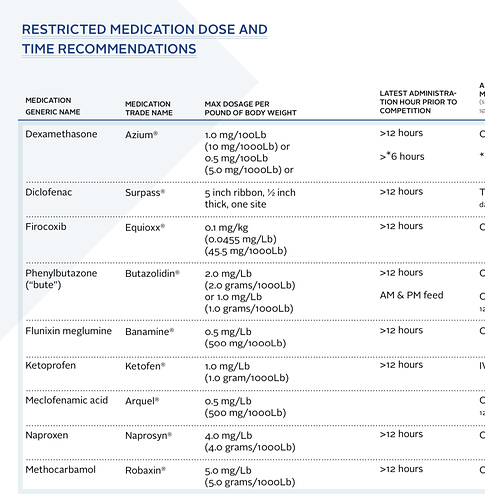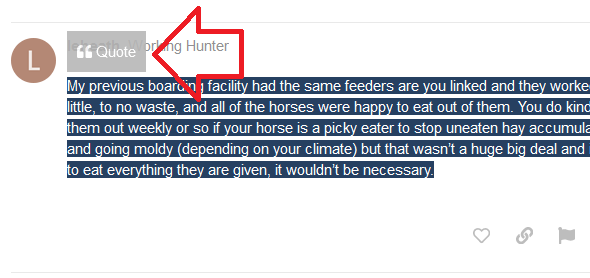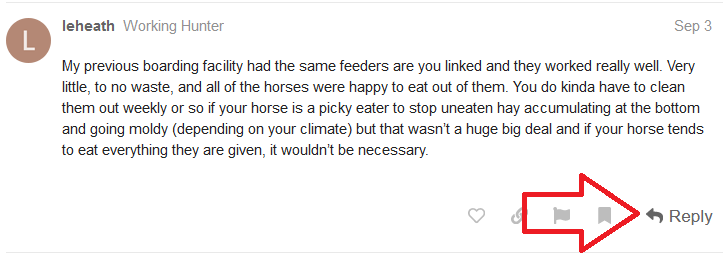Thank you. So who among us is making meaningful change? Who inside this industry has proposed rule changes that really promote horse welfare and has gotten those through USEF? Where is the committee or group in the HJ world that is working with USEF to change even just the abuses some of you have validated? I casually follow this and other forums and read a lot. I haven’t seen any group out there really rallying to fix any of this crap. I may come in hot and I am pretty much and outsider as of late. Still, I got you talking. Didn’t I? I may not make much of any difference, but some of you are thinking about it now. That is better than nothing, so I’m going to take that as a win.
This is an emergency pedantic interruption: It’s HEARsay, as in “I heard it, now I’m sayin’ it.”
Now returning to the scheduled programming…
Like I said, devil’s advocate. A full container of sharps would certainly raise my eyebrows. I don’t travel in A HJ circuit as it’s not my core discipline but a lot of injections on-site is not something you see at dressage shows or trials.
All of this. My 3’3 green horse was a dressage horse in Europe prior to import. While she is fortunately very sound, she has pronounced windpuffs behind and her fetlocks/tendon sheaths tend to fill quite a bit when she’s worked hard. My vet said she very commonly sees this in younger dressage horses, and much more rarely in hunters/jumpers.
No one is saying they can’t “stay sound without bute shots.” I give my horses banamine and occasionally robaxin at shows, mostly because at home they are used to many hours of grass turnout to stretch and roll, reduce stocking up, etc. They get none of that at shows and while I get them out to hand graze or tack walk as much as possible, it’s still hours less a day than they are used to.
I did not know you were allowed to do this at shows.
USEF’s medication rules do permit use of Robaxin and/or Banamine as long as they’re not administered within 12 hours of competition. So if a horse finishes classes at 4pm on Saturday, a dose could theoretically be given up until 9pm afterwards if the horse was showing the next morning at 9AM.
https://www.usef.org/forms-pubs/2Zp2C_YKs4s/2022-equine-drugs-medications
Thank you for being honest. Your horses are lucky they have turn out at home. I know, personally not hearsay, many dressage and hj people who don’t turn out at least some if not all of their horses, or their turnouts are not much bigger than a stall and hard bare ground. I believe it is a hj culture thing to give horses banamine, bute, previcoxx, robaxin, etc at shows. The dressage trainers I know just don’t do this. My relatives that show HJ practically live at shows and so do their horses. It is very hard on them and to me sad for them. For the dressage circuit we have several local one and two day shows. You will see plenty horses tied to trailers at one day shows. Many competitors go to a couple or a few 2 and 3 day shows a season, and many qualify for championships by only attending 1 day shows. For the championships you can be away for 5 or 6 days but that is only one time a year. Very few people are gunning to go to the US dressage finals or Lamplight or anything that is out of their region. The culture is way different. The show scene is so much easier on their horses. I honestly think it is unfair to the horses if they need pain killers and muscle relaxants because they spend so much time in a little hot box and under the stresses of a show environment. However, I will reiterate this. It is an accepted part of the hj jumper culture and the reason that there are so many needles at shows. I have a relative who competes currently on both coasts and in Wellington. Her old Wesr coast big name trainer just gave the horses things like Depo, Dex, Robaxin, and previcoxx, even if they weren’t sore or hot. Again, this was called “standard industry practice”. Their trainer on the East coast has the same game book. People can tell me til they are blue in the face that it is not part of the culture to rely on drugs at HJ shows, and maybe it isn’t for all barns. However, it is for a large percentage of them, and this is no big secret either. It is not like USEF doesn’t know this. It is not like it is a new thing. People can argue whether or not it is against horse welfare to drug your horse at shows. People can argue whether it is against horse welfare to spend as many weeks a year at shows as many hunter jumper people do. I think both are unfair to the horse, and this should change.
The reality of USEF/USHJA and assorted other self regulating (luxury) hobby clubs is the majority of their dues paying membership is transient…they only join the clubs if they have to in order to participate in competitions, shows, events or whatever requires membership.
When they, their kids, spouses, partners, exes or whoever age out, , no longer compete, sell the horse, dogs, boat, race and/or classic cars, dune buggy, motorcycle or whatever? They don’t renew their membership. So most of the membership at any given time, has no history, no long term goals and really has little interest in anything other then having a place to compete if and when they choose to. Other then that, they don’t care.
I’m sure OP here is currently an active member of USEF/USHJA and the only way to bring about change is through those channels. Complaining on here about what “everybody” is doing solves nothing. Coming up with possible solutions needs to be proposed through the rule change process, not wasting energy proposing solutions on here to an audience that may or may not be able to support proposed changes or even be interested in actually getting involved. Or they can’t because they aren’t eligible.
Think everybody should experience what its like to serve on a board governing something. Club, Condo Board, sports club or even a horse related club. God bless them…
ETA yes, lifetime member. Aged out but occasionally still contribute opinions on proposed rule changes. Was a director for a large regional breed club- for 1 term 
20 years around shows is nothing, try 50. Same song, different verse. But things are sure better then they were and continue to improve…veeeeerry sloooooooowly 
All of those things sound good. Honestly, they are well thought out. However, I beg to differ with you on the lameness specialists. These people do not need a vet degree. They are not doing any diagnostics. They are just determining on the date of competition whether or not a horse has a gait abnormality that is apparent, and even without any diagnosis, it would be prudent not to compete the horse on this day.
I’m sorry but this is still a ridiculous solution. What some people consider a gait abnormality may be the horse’s natural way of going and to have a lay person decide if the horse can show that day or not is preposterous. (Anyone remember Leslie’s horse that had a locking stifle that jumped the big Grand Prix? It would have been eliminated in this scenario.) To have someone who is not a trained vet with a degree to back it up determine if a horse can or cannot show based on their decision, is asking for a lawsuit. It’s not just the cost of showing in that class - it’s the cost of the horse’s entire life. Whether or not you like it, horse’s are a multibillion dollar sport at this point and to have someone who has not studied for years to learn the nuances about horse movement make a decision that might destroy a horse’s value is not a solution.
That would lead to more horses going to slaughter or ending up in poor situations than we have now.
So who among us is making meaningful change? Who inside this industry has proposed rule changes that really promote horse welfare and has gotten those through USEF? Where is the committee or group in the HJ world that is working with USEF to change even just the abuses some of you have validated?
There are committees within the USHJA that are working on horse and rider welfare and have gotten new rules passed. I suggest everyone read the rule book and any proposed rule changes that are sent to all members.
Thank you. I appreciate your perspective and feel that it is consistent with that of many people. I have served on many boards including my state USDF chapter in different capacities for many years. I am not the member currently of any HJ associations. I have not shown HJ in 20 years but showed for over 20. I have been around too.
I don’t agree with a perspective that I believe favors $ and peoples’ wants over horse welfare. I also 100 percent believe that a trained specialist could determine whether a horse is fit to show. It would be part of the USEF show agreement. Suing anyone involved would result in a lifetime ban from showing at USEF shows. The lameness specialists would be protected by USEF. USEF would not leave them high and dry if they were sued by somebody.
I am not familiar with the GP horse with locking stifles, but this horse very likely should be prohibited from competing in my senario. Normally there is stifle pain associated with an upward fixating patella. I had a horse who struggled with this when she was young. It was painful. With proper shoeing, and muscle development, it was something the horse outgrew. I would not have shown that horse while they were struggling with this issue. As I have said before, I believe the definition of “serviceably sound” in the horse industry (especially with some of the HJ people I know personally) is not whether or not a horse should be ridden or should be ridden at a certain level, but whether or not they can physically still do and do it compliantly.
I also really don’t like the argument that if lame horses aren’t permitted to show there will be more thrown away or slaughtered. It is not ok to abuse a horse because it might receive a harsher abuse elsewhere. I can’t beat my kids because they may get beat and raped if child protective services removes them from my abusive home and they get beaten and raped at a foster home. Moreover, people who send their horses to auctions or an otherwise terrible end because they are no longer “useful” ought to be outed and chastised big time.
To have someone who is not a trained vet with a degree to back it up determine if a horse can or cannot show based on their decision, is asking for a lawsuit.
I am a USEF official, not an FEI official, but it is my understanding that that (someone who is not a trained vet with a degree to back it up determines if a horse can or cannot show) is EXACTLY what happens at FEI competitions. There is a vet present at the jog for consultation, but it is the ground jury (the vast majority of which are NOT trained vets) make the decision.
I believe you are correct and there are not lawsuits all over the place when a horse doesn’t make it through the jog. The USEF could provide more training to lameness specialists, more like the training I know dressage judges get. They could also pay them way better than they do the drug testers, who they pay very little. Again, I would be fine with paying more at shows to cover this. Then again, I compete in dressage shows, and I don’t spend 1/3 to 1/2 of my life at shows.
Anecdotal I know, but my old jumper had a very severe stringhalt. I cannot tell you how many random laypeople (parents, spectators) felt bold enough to say straight to my face “your horse is so lame you shouldn’t be riding it!”. I can’t imagine if those people had the power to not let me show. Yes there would be a lawsuit, and I am not a litigious person.
(One time, someone’s dad followed me all the way back to the stabling mansplaining every step how lame my horse was.)
also really don’t like the argument that if lame horses aren’t permitted to show there will be more thrown away or slaughtered.
This might happen. Or they will be shown on local circuits where there are mostly zero drug regulations (California is an exception since the state does drug testing; there may be others). Or end up in a non-show program, or as a practice horse for someone who shows. Or become a lesson horse. Or get sent to an auction, possibly ending up in one of the above scenarios. Or get nerved. Or get retired or semi-retired. Or get euthanized (I’m distinguishing euthanasia from slaughter, with the latter occurring in a slaughterhouse).
If the OP’s hypothesis is that the horses that are shown lame or medicated are owned or controlled by people who don’t care, it would follow that that these same people would be likely to dump the horse.
I am over all the horse abuse BS that is rampant in the horse world, but especially in the HJ world.
I have not made blanket statements.
Okay
It is a little hard to judge in a moving image with the horse under tack, but that horse is at least an 8 (noticeable crease down the back), in a score that goes from 1 to 9.
If that’s an eight, I have some 10s trotting around at home 

 It isn’t just the booty, you have to judge the whole horse and it has a wee neck, not seeing a lot of jiggle in the flank or shoulder either.
It isn’t just the booty, you have to judge the whole horse and it has a wee neck, not seeing a lot of jiggle in the flank or shoulder either.
So, this is an excellent point
Wanderlust-
“No one is saying they can’t “stay sound without bute shots.” I give my horses banamine and occasionally robaxin at shows, mostly because at home they are used to many hours of grass turnout to stretch and roll, reduce stocking up, etc. They get none of that at shows and while I get them out to hand graze or tack walk as much as possible, it’s still hours less a day than they are used to.”
Do folks here calling out H/J folks for “drugging” does this count? It’s giving meds (drugs) at a show. It is legal if done properly. Do people consider this cheating?
OR
Is it good horse management because you are reducing pain/inflammation/stiffness because the horses’ have limited turnout and are working/jumping reasonably hard?
[Being someone who has given bute after cross country, especially when the ground is hard, w/ the proper window of time before show jumping, I could consider this simply good horse management]
So, this is an excellent point {referring to Wanderlust’s post about banamine/robaxin- wish I knew how to quote}
Do folks here calling out H/J folks for “drugging” does this count? It’s giving meds (drugs) at a show. It is legal if done properly. Do people consider this cheating?
I don’t consider it “cheating”. But I do consider it poor horse management.
If I needed to give my horse Robaxin and Banamine to be comfortable at multi-day shows, I would stop taking that horse to multi-day shows.
wish I knew how to quote
Quoting is one of the easier to use features on this forum.
Great instructions on how to quote, and so many other things can be found here:
Here is a walk-through of many of the Discourse (our new Forums platform) features available, and below is an FAQ with help for specific questions.
Also, here’s a YouTube video that provides a walkthrough of some features if you’d like to check that out.
General Board FAQs
How do I log out?
Click your avatar in the upper right corner, then click your username. Click logout.
[how do l log out]How do I logout and log back in with a different username?
The forum pulls your user credentials f…
Here are the instructions on quoting:
How do I quote?
Discourse has a couple options to quote a post. The easiest way is to highlight the info you’d like to quote. A “quote” button will pop up:
Click the “quote” button and the info will be quoted in your reply window:
Another option to quote a post:
Click the “Reply” button on the post you’d like to quote:
Then click the speech bubble at the top of the reply window to quote:





